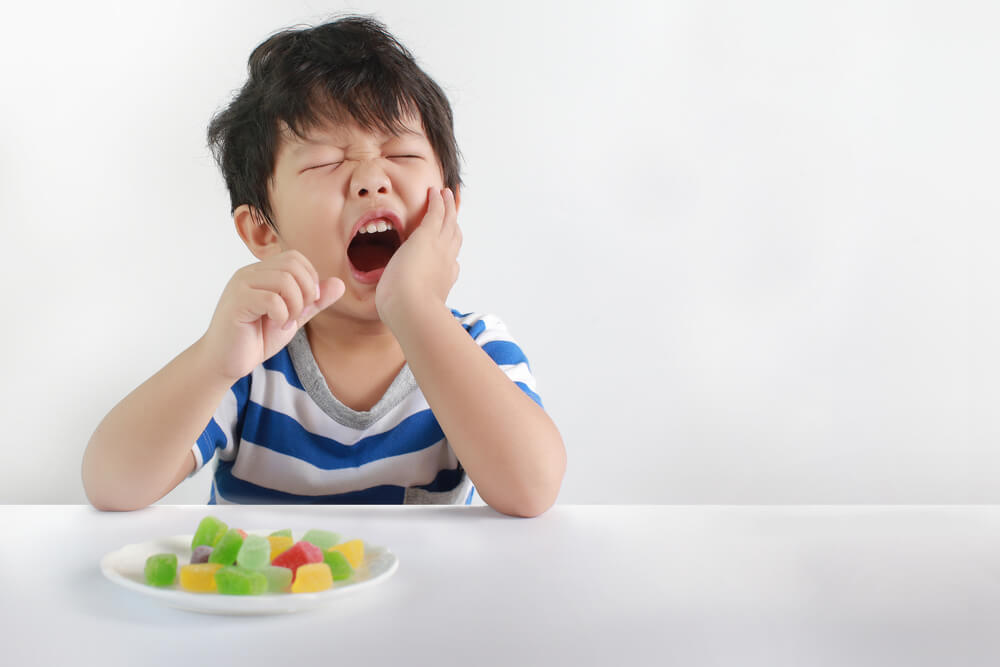
When it comes to cavity prevention, the first things that probably come to mind are brushing, flossing and going to the dentist. And, yup, making sure your child is practicing good oral hygiene and receiving routine dental care is crucial. However, there is another factor that also plays a big role in preventing tooth decay in children and that’s diet.
So, what foods cause cavities in kids? Are there certain things children can eat to prevent decay? That’s exactly what the team at Bitesize Pediatric Dentistry will be going over in this post.
Table of Contents
How Do Cavities Develop?
First things first, how do kids get cavities? Well, everyone, children and adults alike, have bacteria in their mouth. These bacteria feed on sugars and starches whenever your child eats or drinks and, as they do, they release acids.
The acids leach minerals from the enamel and also mix with bacteria, saliva and food debris, forming plaque, that sticky bacterial film that clings to the teeth. The acids in plaque further dissolve the enamel. Over time, if the lost minerals aren’t replaced and plaque isn’t consistently removed from the teeth, tooth decay begins to occur. As tooth decay progresses, a hole can form in the tooth, known as a cavity.
Wait…Are Carbs Bad for Teeth?
While people often worry about the effects of sugar on teeth, you may have noticed that we said oral bacteria feed on sugars and starches. These cavity-causers love carbohydrates. But, it’s not necessarily that carbs are bad for teeth and should be sworn off altogether. Kids need complex carbohydrates as part of a balanced diet.
However, when little ones are eating a lot of fermentable carbohydrates, sweet or not, it does promote tooth decay. Fermentable carbohydrates include many sugars and refined starches. They feed oral bacteria because they start breaking down in the mouth. This is unlike more complex carbohydrates, which are broken down further in the digestive system, making them less likely to cause cavities.
And, another thing to consider concerning kids and carbs, is how often they eat is just as important as what they eat. Those acid attacks we discussed occur while food is in the mouth and for about 30 minutes afterwards. Then, the pH in the mouth returns to normal and the minerals in saliva start to work their magic, replacing the lost minerals.
Since the clock starts over with every sip or bite, frequent snacking or drinking sugary beverages prolongs your child’s exposure to the cavity-causing acids. Additionally, less saliva is produced while snacking as compared to eating a meal, meaning sugars and starches are more likely to sit on the teeth. That’s why, if you do give a child a sugary or starchy treat or sweet beverage, it’s best if they enjoy it as part of a larger meal.
Foods that Cause Cavities
We talked about sugars, starches and fermentable carbohydrates, but there are a few more elements that come into play when determining what foods cause cavities.
The likelihood of a specific food causing cavities depends on:
- Whether it contains carbohydrates, particularly those fermentable carbs
- How quickly it is eaten
- How long it will be stuck on the teeth
Time is a key determinant. Not all foods with sugars and starches are created equal. Those that will stick in the teeth and/or are eaten slowly will keep kids’ enamel in contact with cavity-causing acids for a longer period of time, potentially causing more damage.
For example, a firm fruit like a raw pear contains sugars, but it is usually eaten in one sitting and doesn’t get trapped in the teeth. Dried fruit, on the other hand, is often eaten pretty leisurely and is notorious for getting stuck in the teeth, so it’s much more likely to cause cavities when kids eat it often.
Things like crackers and pretzels might seem much healthier than, say, ice cream, and they may be in some respects, but as far as dental health, they’re not. Ice cream, while full of sugar, melts, so it’s eaten quickly and it rinses easily from the teeth. Crackers and pretzels are refined starches, eaten in a snack setting and they tend to work their way in between the teeth.
Lastly, acidity is important too. Acidic foods and drinks can speed up enamel dissolution and make teeth more susceptible to decay.
With that information in mind, foods that are likely to cause cavities include:
- Crackers
- Pretzels
- Chips
- White bread
- Muffins
- Cakes and pastries
- Cookies
- Hard candy
- Sticky or chewy candy
- Soda and other fizzy drinks
- Energy drinks
- Sports drinks
- Commercial lemonade and iced tea
- Fruit juice
- Dried fruit
- Fruit snacks
- Breakfast cereal
Most of the foods above are processed. This is because dried, processed foods generally have added sugars and refined starches, stick in the teeth, and don’t usually retain enough nutrients to balance out the negative effects.
It’s important to note that the recommendations for diet and nutrition in oral health do vary a little from those surrounding systemic health. Items like 100% fruit juice with no sugar added or fortified breakfast cereals have health benefits. That said, it’s best to give them to kids in moderation and, when possible, get those vitamins and minerals from whole foods.
Healthy Food for Kids’ Teeth
When it comes to nutrition for healthy and teeth gums, there are certain vitamins and minerals that are needed to strengthen kids’ smiles, including:
- Calcium
- Arginine
- Vitamin D
- Phosphorous
- B vitamins
- Vitamin C
- Vitamin A
Calcium, phosphorus and arginine actually help to remineralize kids’ teeth and reverse the effects of cavity-causing acids. You can get these nutrients from foods, such as nuts and seeds, milk, cheese, yogurt, lentils, beans and whole grains.
Though vitamin C is found in many acidic foods like citrus fruits and tomatoes, it keeps the gums and connective tissues that hold the teeth in place healthy. To reap the nutritional benefits of acidic foods or sugary fruits like bananas, make sure kids eat them in moderation and as part of a varied diet. If you can, serve them with a meal instead of as a snack.
The best foods and drinks for kids’ teeth that either unlikely to or won’t cause cavities include:
- Nuts and seeds
- Cheese
- Milk
- Raw, crunchy veggies
- Raw, leafy greens
- 100% nut butters with no sugar added
- Poultry and other meats
- Tofu
- Lentils
- Eggs
- Hummus
- Healthy fats (i.e., certain oils, avocados, etc.)
- Water
There are other foods that, if eaten all day long or in large quantities, could possibly promote tooth decay. But, they’re either necessary for a balanced diet or have smile-friendly nutrients that negate much of the risk, such as:
- Whole grains
- Fresh, firm fruit
- Smoothies
- Yogurt
- Oatmeal
- Beans
Choosing foods from these two lists and opting for things like dark chocolate, ice cream or popcorn for special occasions instead of candy or crackers will go a long way in preventing cavities in toddlers, kids and teens.
How to Prevent Cavities
Nutrition and good oral health go hand in hand. But, in addition to ensuring kids eat a healthy diet full of fresh vegetables and fruits, lean proteins, dairy or dairy alternatives, healthy fats and complex carbohydrates, here are some other steps you’ll want to take for cavity prevention:
- Have kids brush their teeth at least twice a day for two minutes each time using a soft-bristled toothbrush. Be sure they floss once daily too.
- Limit snacking and when kids do have a snack, offer something low in fermentable carbohydrates like cheese, nuts or crunchy vegetables. Instead of slowly eating or drinking, have them finish the snack in one sitting.
- If kids eat something that will coat their teeth in sugar (we’re looking at you, lollipops) or get stuck, like sticky candy, ask them to brush their teeth afterwards or at least swish with some water.
- Speaking of water, plain water does not cause cavities and even helps to wash away food debris and plaque, so offer kids water throughout the day.
- Visit your Brooklyn pediatric dentist for dental sealants as soon as your child’s first permanent molars erupt around age six or seven and, again, when their second permanent molars come in around age 12. According to the Centers for Disease Control and Prevention, sealants can prevent up to 80% of cavities in the back teeth.
- Give kids starchy and sugary treats in moderation and really sticky foods only on very special occasions. Whenever possible, instead of as a snack, have them eat these foods with or at the very end of a meal when their saliva will help wash the sugars and starches away.
- If kids do have the occasional acidic drink or food, ask them to rinse their mouth with water and wait 30 minutes to an hour after they eat or drink to brush their teeth. Brushing their teeth immediately can damage the enamel while it’s temporarily weakened from the acids.
- Older kids may want to chew on sugarless gum or suck on a sugar-free mint after meals. This stimulates saliva production and helps to clean the teeth. Bonus points if it contains xylitol. It’s thought that xylitol helps to prevent cavities by reducing plaque formation and inhibiting the growth of cavity-causing bacteria.
- Schedule a routine dental exam and cleaning for your child every six months. During professional cleanings, we can remove hardened plaque (tartar) that can’t be eliminated at home with a regular toothbrush and floss, which helps reduce the risk of cavities and gingivitis. Routine exams let us spot problems while they’re still reversible or, at least, more easily and affordably treated.
Schedule a Visit at Bitesize Pediatric Dentistry in Brooklyn, NY
At our bright, kid-friendly practice, we believe in education and prevention. Our dentists take the time to get to know our patients and their families and understand their lifestyle and needs. This helps us create tailored cavity prevention plans and give parents personalized recommendations on everything from nutrition for healthy teeth and gums to brushing and flossing.
Schedule an appointment for your child at Bitesize Pediatric Dentistry in DUMBO, Park Slope or Williamsburg, Brooklyn today!







